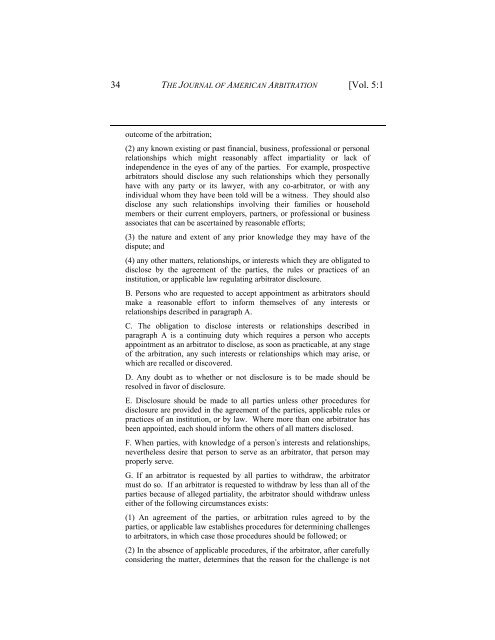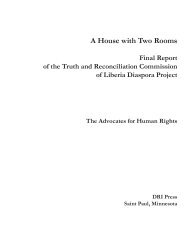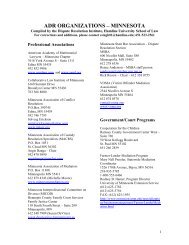2006/Vol. 5 No.1 - Hamline Law - Hamline University
2006/Vol. 5 No.1 - Hamline Law - Hamline University
2006/Vol. 5 No.1 - Hamline Law - Hamline University
Create successful ePaper yourself
Turn your PDF publications into a flip-book with our unique Google optimized e-Paper software.
34 THE JOURNAL OF AMERICAN ARBITRATION [<strong>Vol</strong>. 5:1<br />
outcome of the arbitration;<br />
(2) any known existing or past financial, business, professional or personal<br />
relationships which might reasonably affect impartiality or lack of<br />
independence in the eyes of any of the parties. For example, prospective<br />
arbitrators should disclose any such relationships which they personally<br />
have with any party or its lawyer, with any co-arbitrator, or with any<br />
individual whom they have been told will be a witness. They should also<br />
disclose any such relationships involving their families or household<br />
members or their current employers, partners, or professional or business<br />
associates that can be ascertained by reasonable efforts;<br />
(3) the nature and extent of any prior knowledge they may have of the<br />
dispute; and<br />
(4) any other matters, relationships, or interests which they are obligated to<br />
disclose by the agreement of the parties, the rules or practices of an<br />
institution, or applicable law regulating arbitrator disclosure.<br />
B. Persons who are requested to accept appointment as arbitrators should<br />
make a reasonable effort to inform themselves of any interests or<br />
relationships described in paragraph A.<br />
C. The obligation to disclose interests or relationships described in<br />
paragraph A is a continuing duty which requires a person who accepts<br />
appointment as an arbitrator to disclose, as soon as practicable, at any stage<br />
of the arbitration, any such interests or relationships which may arise, or<br />
which are recalled or discovered.<br />
D. Any doubt as to whether or not disclosure is to be made should be<br />
resolved in favor of disclosure.<br />
E. Disclosure should be made to all parties unless other procedures for<br />
disclosure are provided in the agreement of the parties, applicable rules or<br />
practices of an institution, or by law. Where more than one arbitrator has<br />
been appointed, each should inform the others of all matters disclosed.<br />
F. When parties, with knowledge of a person’s interests and relationships,<br />
nevertheless desire that person to serve as an arbitrator, that person may<br />
properly serve.<br />
G. If an arbitrator is requested by all parties to withdraw, the arbitrator<br />
must do so. If an arbitrator is requested to withdraw by less than all of the<br />
parties because of alleged partiality, the arbitrator should withdraw unless<br />
either of the following circumstances exists:<br />
(1) An agreement of the parties, or arbitration rules agreed to by the<br />
parties, or applicable law establishes procedures for determining challenges<br />
to arbitrators, in which case those procedures should be followed; or<br />
(2) In the absence of applicable procedures, if the arbitrator, after carefully<br />
considering the matter, determines that the reason for the challenge is not
















